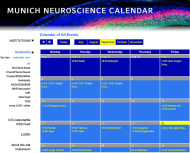PhD position - Rainer Glass group
New pericytes in the adult brain originate from a previously unrecognized pericyte precursor
18.05.2018
A PhD-project with secured funding for 3 years is available under supervision of PI Rainer Glass, Walter-Brendel-Centre of Experimental Medicine, University Hospital, LMU Munich, Munich, Germany; Neurosurgical Research, University Hospital, LMU Munich, Munich, Germany; project-start can be arranged for September 2018.
The group is looking for a person willing to intellectually advance the project, to use transgenic mouse-models for neuroscience, to explore brain physiology and pathology by (confocal) microscopy (and immunofluorescence), to develop concepts for pharmacological modulation of pericyte precursors and to obtain a sound genetic characterization of our target cell population in order to investigate an new precursor cell-type in the brain.
Synopsis of the scientific background of the project: Pericytes are essential for maintaining the stability of CNS blood-vessels and the blood-brain-barrier. They are closely associated with endothelia and can be identified by a set of markers. New pericytes are required during neo-angiogenesis but how pericytes are generated in the adult brain is unknown. We investigated neoplastic vascularization of the adult brain in a transgenic lineage-tracing model. We observed that mature pericytes largely originate from a newly identified precursor cell-type, which is distinct from established brain cell-populations as evidenced by single-cell RNAseq studies. These precursors are characterized as pericyte marker-negative cells of non-hematopoietic origin, which are distant from blood-vessels and highly proliferative. Pericyte precursors emerge also in developmental angiogenesis and lineage ablation experiments in brain tumor models showed that they are necessary to generate new, mature pericytes supporting tumor expansion. Overall, pericyte precursors control vascular plasticity and provide an excellent therapeutic target for brain tumors.
- Adult brain pericytes originate from newly identified pericyte precursors
- Pericyte precursors are active in developmental or pathological angiogenesis
- Pericyte precursors are required for neoangiogenesis
- They are genetically and physiologically distinct from established cells in the CNS
Outline for the future project: We identified a non-vascular pericyte precursor, which is necessary for vascular-plasticity and –stability during periods of neo-angiogenesis. We have developed several transgenic mouse models to study these cells in vivo by lineage-tracing, linage-ablation and abrogation of their precursor cell-identity. We aim to uncover the biological-role of the pericyte precursors in stroke, neurooncology and/or development and will agree with our PhD candidate upon the physiological and pathological background of the project (according to the candidate´s preferences). In addition to morphological and immunohistochemical inspection of brain preparations will use techniques for vessel-isolation, cell-separation and single-cell RNAseq analysis from transgenic mouse brains and can extent our research to the use of human brain specimen.





